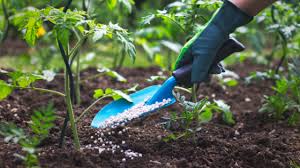Let us look at the different types of fertilizers and how they work. Fertilizers are chemical substances supplied to the crops to increase their productivity and these are used by the farmers daily to increase the crop yield.
The fertilizers have the essential nutrients required by the plants including nitrogen, potassium, and phosphorus. They enhance the water retention capacity of the soil and increase its fertility.
Fertilizers are economically beneficial to farmers. They expedite plant growth and are not so expensive to procure. The plants also have a superior appearance that means they appear greener and healthier when we use fertilizers.
However, fertilizers can harm the environment. They have synthetic chemicals that are not biodegradable. They can cause both soil and water pollution. Over time fertilizers make the soil acidic causing soil degradation. So, by comparing manure and fertilizers, fertilizers are a better source of nutrients for the plant, manure is a better alternative as far as the environment is concerned.
See Also: The Different Types of Manure and How they Work
There are 13 nutrients that are vital for plants to grow and thrive.
These can be divided into MACRO-NUTRIENTS, elements of which plants require large quantities, and MICRO-NUTRIENTS (elements that are required by the plant in smaller amounts). A micro-nutrient, though required in small doses, is not less vital for plant growth.
MACRO-NUTRIENTS
PRIMARY NUTRIENTS:
• Nitrogen (N), Phosphorus (P), Potassium (K)
SECONDARY NUTRIENTS:
• Calcium (Ca), Magnesium (Mg), Sulfur (S)
MICRO-NUTRIENTS
• Iron (Fe), Boron (B), Copper (Cu), Chlorine (Cl),
• Manganese (Mn), Molybdenum (Mo), Zinc (Zn
The availability and mobility of these 13 plant nutrients in the soil and in the plant itself is highly variable, and this has implications for responsibly managing plant nutrition, fertilization and irrigation.
IMPACT OF FERTILIZERS
Fertilizers play a very important role in the development of crops by providing the required nutrients. They may improve the quality of crops.
Fertilizers help improve yield, which is one of the most crucial requirements for bridging the gap between an ever-increasing human population and limited arable land.
TYPES OF FERTILIZERS
Different types of fertilizers are mentioned below:
INORGANIC FERTILIZERS
Inorganic fertilizers are chemical fertilizers that have nutrient elements for the growth of crops made by chemical means. The inorganic fertilizers are of the following types:
Nitrogen Fertilizers – Nitrogen fertilizers contain nitrogen essential for the development of crops.
Nitrogen is the major constituent of chlorophyll that maintains a balance in the process of photosynthesis. It is a part of amino acids in plants and constitutes protein.
Nitrogen fertilizers develop the production and quality of agricultural products. Nitrogen fertilizers include UREA,NPK,CAN, etc
Phosphorus Fertilizer – The major nutrient in a phosphorus fertilizer is phosphorus. The efficiency of fertilizer depends upon efficient phosphorus content, methods of fertilizing, properties of soil and crop strains.
Phosphorus found in the protoplasm of the cell plays a very important role in cell growth and proliferation. The phosphorus fertilizer is useful for the growth of the roots of the plants. Example is DAP,SSP.
Potassium Fertilizer – Potassium fertilizers work well in sandy soil to develop the quality of plants and vegetables by increasing the potassium content in inadequate fields.
The two main varieties of potassium fertilizer are:
1) Sulfate of potash and
2) Muriate of potash.
Sulfate of potash is made by treating potassium chloride with magnesium sulfate to generate a fertilizer that can be used to enrich garden soil any time up to sowing.
ORGANIC FERTILIZERS
Organic fertilizers are natural fertilizers these are obtained from plants and animals. It enriches the soil with carbonic compounds essential for plant growth.
Organic fertilizers increase the organic matter content of the soil, promotes the reproduction of microorganisms, and changes the physical and chemical properties of the soil.
It is considered to be one of the main nutrients for green food.
MANURE AND FERTILIZER AS POTENTIAL ENVIRONMENTAL CONTAMINANTS
Improper manure and fertilizer management can affect soil quality in the following ways:
Livestock manure can be a rich source of soluble ions that are sodium (Na+) and potassium (K+) because animals retain a very small amount of the salt they consume.
Repeat applications of manure at rates exceeding agronomic conditions can contribute to saline soil conditions. The long-term buildup of sodium ions can harm soil structure by reducing soil particle aggregation.
Frequent traveling by loaded application equipment on wet soils could lead to soil compaction. Soil particles are squeezed together by compaction, reducing pore spaces obtainable for air and water storage. This can inhibit root growth and raise surface runoff.
Read Also: Why you need to change your Poultry Litters
